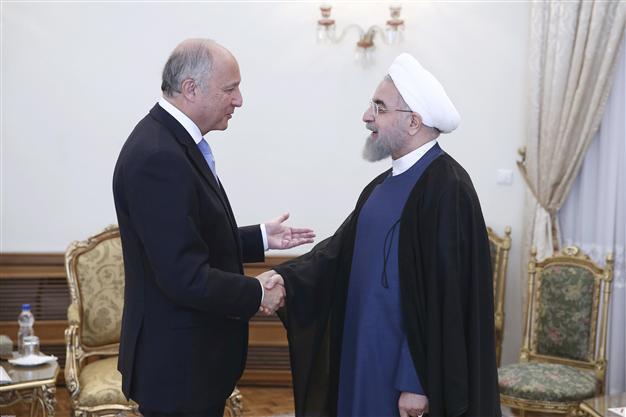France seeks to warm up Iran ties with Rouhani invite
TEHRAN - Agence France-Presse

AP photo
France sought to revive its relations with Iran on July 29, inviting President Hassan Rouhani to visit Paris in November, in a gesture that swiftly follows this month's historic nuclear deal.
The offer came in a letter delivered by French Foreign Minister Laurent Fabius, visiting Tehran on a short trip that has attracted a mixture of optimism and criticism in the capital.
Fabius said the July 14 nuclear accord between Iran and six world powers including France offered the chance for rapprochement after years of strain.
But some Iranian media have since attacked the diplomat's hawkish stance in the nuclear talks.
He has also been criticised over his role in a tainted blood scandal that killed hundreds of Iranians in the 1980s.
Fabius, his country's first foreign minister to visit since 2001, told reporters at the French embassy that it was an important trip that could offer a new beginning.
"We are two great, independent countries. It is true that in recent years, for reasons that everyone knows, the ties have cooled but now thanks to the nuclear deal, things will be able to change," he said.
Around the time Fabius landed in Tehran a small but vehement group of protesters gathered at Mehrabad Airport to oppose the visit, citing the blood deaths that occurred when he was France's prime minister.
"King of Aids, you are not welcomed," one billboard read, while another stated: "We will neither forgive nor forget."
The slogans related to the French National Blood Transfusion Centre, which decades ago exported products contaminated with the AIDS virus.
Fabius was acquitted in 1999 by French courts over the affair, in which people in France also died.
Iran's Tasnim news agency said some protesters who were asked to end their demonstration had been briefly detained.
But Fabius held a short press conference with his Iranian counterpart Mohammad Javad Zarif, where the invitation to Rouhani from French President Francois Hollande was announced.
If taken up, the trip would be the first to France by an Iranian president since 1999.
Rouhani was elected in 2013 after pledging to push for a diplomatic end to a then decade-long crisis over the Islamic republic's disputed nuclear activities.
"From now, we hope to deepen our relations in all areas," said Zarif, standing beside Fabius, with both noting that political dialogue had resumed at ministerial level.
"We want to start a new chapter in a sense of common interest," Zarif added, mentioning "the fight against terrorism" in a nod to possibly greater cooperation in fighting Islamic State of Iraq and the Levant (ISIL) jihadists in Iraq and Syria.
A French economic and trade delegation accompanied by the agriculture minister and deputy foreign ministers are to visit Tehran in September, officials announced.
"With the new deal -- the lifting of sanctions -- France intends, if Iran is willing, to be more present in several areas... political, economic, cultural," said Fabius before meeting Rouhani.
The nuclear deal was struck by Iran and the five permanent members of the UN Security Council -- Britain, China, France, Russia and the US -- plus Germany.
Iran, which has always denied seeking an atomic bomb, agreed to curbs on some but not all elements of its nuclear programme in exchange for a lifting of UN, US and European economic sanctions.
As France's representative in those negotiations, Fabius adopted an often stiff tone on what Iran must do under any such accord, earning the nickname "the obstacle" in the ultimately successful talks.
He said France's approach had been "firm and constructive" to prevent nuclear proliferation, as an atomic energy programme "was not a trinket to be played with".
But he acknowledged the "respect we owe to each other and to the commitments made" in the deal, which though approved by the Security Council still faces a bruising review in the US Congress.
Despite the nuclear agreement, which Zarif has said he has "no concern or worry" about being implemented, Fabius did not dodge key disagreements in French-Iranian relations.
"There are a number of points on which we have differences," he said, alluding to the conflict in Syria as well as Iran's refusal to recognise Israel.
